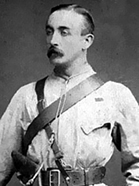Minto, Lord2
Minto, Lord2 Governor General and Viceroy of India from 1905 to 1910. He succeeded lord curzon in November 1905. He, the 4th Earl of Minto, was the grandson of Lord Minto, Governor General of India from 1807-1813. When Minto, a Tory aristocrat, came to India he was quite an experienced man. As a member of armed forces he had gained experience in the second Afghan War, and in Egypt and Canada.
On his arrival in India Minto witnessed the agitation against the partition of bengal, 1905 at its height. Apart from strong press criticism and platform speeches, there were underground revolutionary activities. In spite of series of repressive measures the unrest continued.
Minto faced challenge to his government from two sides (I) the Congress demanding popular participation in the government and (II) a new class of patriots, young and educated, mostly believing in the cult of bomb and pistol, coming forward with the determination to unfurl the flag of independence at all costs.

They looked upon European revolutionaries, such as Mazzini and Kossuth, as their exemplars. Their modus operandi was to kill unpopular and tyrannical British officials. So daring were their deeds that the Europeans in Calcutta, the then capital of British India, became thoroughly demoralised. Even bombs were hurled at Lord and Lady Minto when they were on a state visit to Ahmedabad; it was sheer good luck that they escaped injury. Minto tried to suppress the unrest through punitive legislation and action. Lajpat Rai, bipin chandra pal, aurobindo ghosh and a host of others were arrested; some of these revolutionaries were deported.
Both Morley, the secretary of state for india and Minto recognised that it was essential to encourage and reward the loyal elements. After prolonged deliberations, as well as considering the Muslim demands expressed through the simla deputation, they produced the morley-minto reforms in the shape of Indian Councils Act of 1909. The Congress, at its Lahore Session held in December 1909, expressed its dissatisfaction in its view the excessive and unfair share of representation given to the Muslims by the Morley-Minto Reforms. Thus the vicious circle of agitation and suppression with a periodic dose of constitutional advance continued till Minto's return home.
By a measure, initiated by Minto, two Indians were nominated to the Secretary of State's Council, one (Sir Satyendra Prasanna Sinha, later Lord Sinha of Raipur) to the Governor General's Executive Council and one to each of the Provincial Executive Councils. An Indian was also made a member of the Privy Council. This measure caused unmixed satisfaction to all Indians.
Minto passed the Indian Press Act of 1910 laying down heavy fines and forfeiture of Press for seditious publications. The Act denied almost any independent criticism of the Government. Amidst mounting unpopularity he resigned in November 1910 to be succeeded by lord hardinge, who came with the avowed intention of unsettling the settled fact. [Muhammad Ansar Ali]
